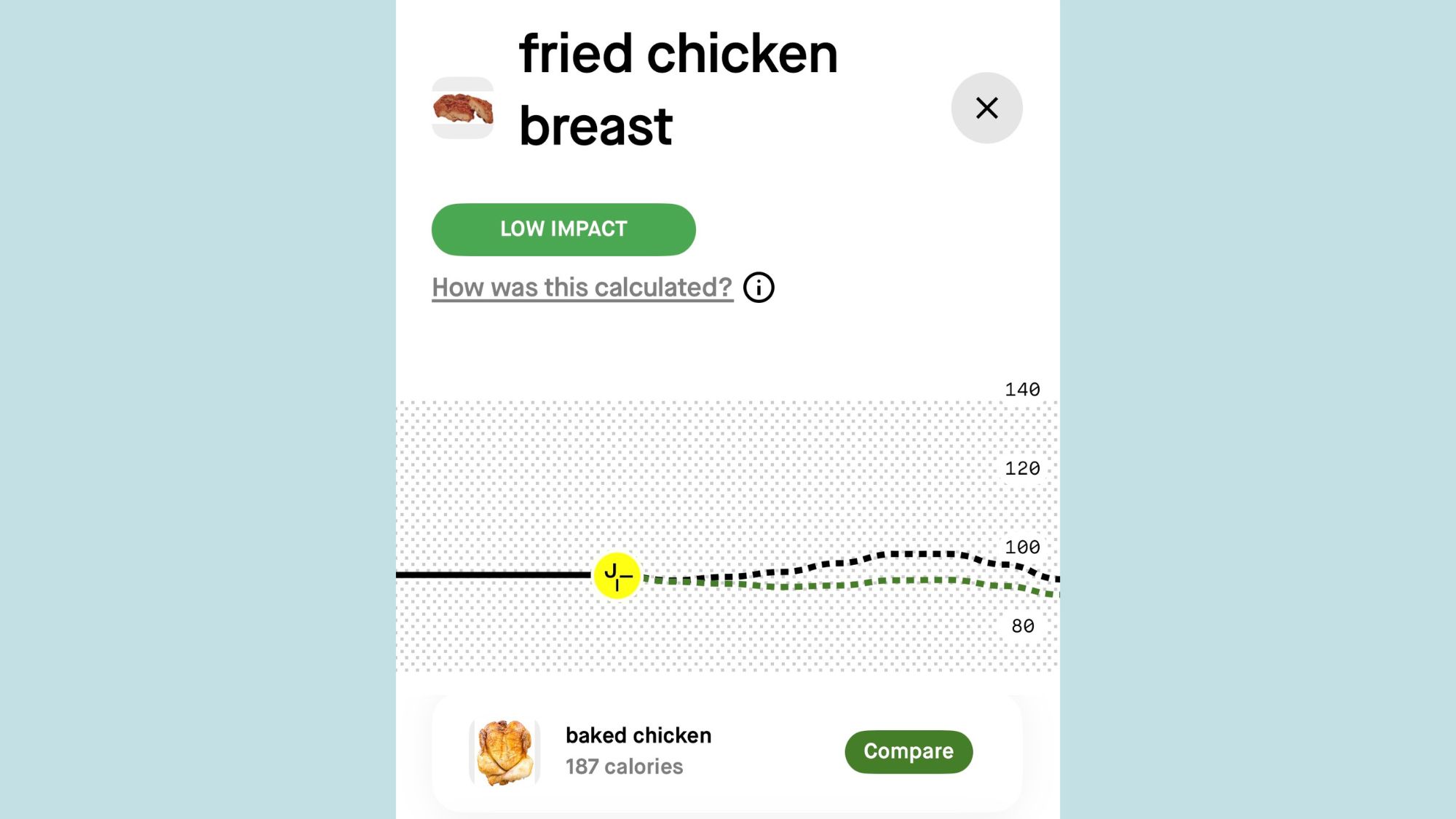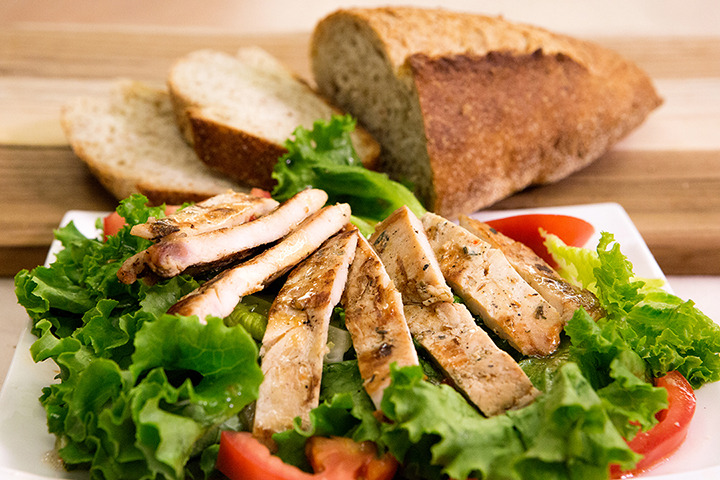How Chicken Consumption Affects Blood Sugar Levels

Chicken consumption has a minimal impact on blood sugar levels. While chicken does not directly raise blood sugar, it can affect insulin response indirectly. The protein content in chicken helps regulate blood sugar levels by slowing down the digestion and absorption of carbohydrates in a meal. This prevents sharp spikes in blood sugar and provides a more stable glucose response. Additionally, the low carbohydrate content of chicken makes it a suitable choice for individuals managing diabetes or those aiming for balanced blood sugar levels. When combined with a well-rounded diet, chicken can be a beneficial addition to blood sugar management strategies.
Does Chicken Raise Blood Sugar Levels: Misconceptions And Facts
There are some common misconceptions surrounding the impact of chicken on blood sugar levels. Despite its high protein content, chicken does not directly raise blood sugar levels. This is because it has minimal carbohydrates compared to other food sources. It is important to note that the method of preparation and the addition of sauces or seasonings can affect blood sugar response. Therefore, it is advisable to opt for grilled or baked chicken without sugary marinades or sauces. Choosing lean cuts and controlling portion sizes are key factors in keeping blood sugar levels stable when consuming chicken.
Impact Of Chicken On Blood Glucose: Proteins And Nutritional Value
Chicken is not only low in carbohydrates but also high in protein. The protein content in chicken plays a crucial role in regulating blood sugar levels. When consumed, proteins break down into amino acids, which can be used by the body to build and repair tissues. Unlike carbohydrates, proteins have a minimal impact on blood glucose levels. Additionally, chicken is a rich source of essential nutrients such as vitamins B6 and B12, which are important for maintaining overall health and supporting proper blood sugar control . Ensuring an adequate intake of protein from chicken can contribute to better blood sugar management and overall well-being.
Health Benefits Of Chicken Consumption

Consuming chicken offers numerous health benefits beyond its impact on blood sugar levels. Chicken is a lean source of protein, which is essential for building and repairing tissues in the body. It is also rich in important nutrients like vitamins B6 and B12, which play a role in maintaining overall health and supporting proper blood sugar control. Additionally, chicken contains minerals such as selenium and zinc, which are vital for immune function and metabolism. Incorporating chicken into a balanced diet can provide these health benefits and contribute to overall well-being.
Chicken As A Lean Protein Source: Importance For Blood Sugar Regulation
Chicken is an important lean protein source that plays a vital role in blood sugar regulation. It provides essential amino acids that are necessary for building and repairing tissues, helping to maintain healthy blood sugar levels. The high protein content in chicken slows down the absorption of carbohydrates, preventing rapid spikes in blood sugar. Incorporating chicken into meals can also promote feelings of satiety and reduce cravings for sugary foods, further aiding in blood sugar control. Choosing skinless chicken and lean cuts ensures a lower intake of saturated fats and calories, making it an ideal protein choice for maintaining stable blood sugar levels.
Nutrients In Chicken: Effects On Blood Sugar Levels
Chicken is not only a great source of lean protein, but it also contains important nutrients that can have positive effects on blood sugar levels. One crucial nutrient found in chicken is vitamin B3, also known as niacin. Niacin plays a key role in converting food into energy and can help regulate blood sugar levels. Additionally, chicken is a good source of minerals such as magnesium and potassium, which are essential for insulin production and glucose metabolism. These nutrients contribute to the overall health benefits of chicken consumption and can support stable blood sugar regulation.
Factors Influencing Blood Glucose Response To Chicken

Several factors can influence the blood glucose response to chicken consumption. One such factor is the cooking method used. Grilled or baked chicken is generally considered healthier than fried chicken, as frying can increase the oil content and add extra calories. Another factor to consider is the seasonings and sauces used in chicken preparation. High-sugar or high-sodium sauces can impact blood sugar levels. Lastly, the portion size of chicken consumed plays a role. Eating excessive amounts of chicken can lead to higher protein intake, which may increase insulin secretion and affect blood glucose levels. It is essential to be mindful of these factors when incorporating chicken into a balanced diet for blood sugar control.
Cooking Methods And Blood Sugar: Grilled, Baked, Or Fried Chicken
When it comes to cooking chicken, the method used can impact blood sugar levels. Grilled or baked chicken is generally considered healthier options, as they don’t involve adding extra oil or fats. Grilling and baking help retain the natural flavors of the chicken without adding unnecessary calories. On the other hand, fried chicken can contribute to a higher glycemic load due to the added oil and breading. It’s important to choose cooking methods that minimize the use of unhealthy fats and oils to maintain stable blood sugar levels.
Chicken Preparation: Seasonings And Sauces Impact On Blood Glucose
The seasonings and sauces used in chicken preparation can have an impact on blood glucose levels. Some sauces and seasonings contain added sugars or high amounts of sodium, which can affect blood sugar regulation. It’s important to choose low-sugar or sugar-free options when marinating or seasoning chicken. Additionally, opting for homemade sauces using fresh herbs and spices can be a healthier alternative. Reading ingredient labels and being mindful of the sauces and seasonings used can help individuals better manage their blood glucose levels and maintain a balanced diet.
Comparing Chicken With Other Protein Sources

When it comes to protein sources, chicken is often compared to other options like red meat and plant-based proteins. Compared to red meat, chicken is typically lower in saturated fat, making it a healthier choice for cardiovascular health. In terms of blood sugar impact, chicken provides a good balance of protein without the added sugars or carbohydrates found in processed meats. On the other hand, plant-based proteins such as tofu or beans can be lower in fat and have a minimal impact on blood sugar levels. Ultimately, choosing the right protein source depends on individual dietary needs and preferences.
Chicken Vs. Red Meat: Blood Sugar Impact Comparison
When comparing chicken and red meat in terms of their impact on blood sugar levels, chicken tends to be a better option. Red meat, such as beef and pork, often contains more saturated fat, which can have a negative effect on blood sugar regulation. On the other hand, chicken is typically lower in saturated fat and can provide a good source of lean protein. This makes it a healthier choice for individuals looking to manage their blood sugar levels. It’s important to note that portion size and cooking methods also play a role in the overall impact on blood sugar levels.
Chicken Vs. Plant-based Proteins: Effects On Blood Glucose Levels
When comparing chicken to plant-based proteins, there are some differences in their effects on blood glucose levels. Plant-based proteins, such as beans, lentils, and tofu, tend to have a lower glycemic index compared to chicken. This means that they have a slower and more gradual impact on blood sugar levels. Plant-based proteins also contain fiber, which can help regulate blood sugar levels and promote better glycemic control. However, it’s important to note that chicken can still be a healthy option and can fit into a balanced diet for blood sugar management when consumed in appropriate portion sizes and with other low-glycemic foods.
Managing Blood Sugar Levels With Chicken Consumption

When it comes to managing blood sugar levels, incorporating chicken into a balanced diet can be beneficial. Chicken is a good source of lean protein, which can help regulate blood sugar and promote satiety. It is important to choose healthier cooking methods such as grilling or baking, rather than frying, to minimize added fats and oils. Portion control is also key, as overconsumption of any food can lead to fluctuations in blood sugar levels. By including chicken in moderation and pairing it with a variety of low-glycemic foods, individuals can effectively manage their blood sugar levels and maintain overall health.
Incorporating Chicken Into A Balanced Diet For Blood Sugar Control
Incorporating chicken into a balanced diet is an excellent strategy for blood sugar control. It is essential to choose lean cuts of chicken, such as skinless breast or thighs, and grill or bake them instead of frying. By pairing chicken with a variety of low-glycemic foods like vegetables, whole grains, and legumes, you can create a well-rounded meal that helps regulate blood sugar levels. It is recommended to consume chicken in moderation and follow portion control guidelines. By incorporating chicken into a balanced diet, you can effectively manage blood sugar levels and maintain overall health.
Recommended Portion Sizes And Frequency Of Chicken Consumption
When it comes to incorporating chicken into a balanced diet for blood sugar control, portion sizes and frequency are important factors to consider. It is recommended to consume chicken in moderation and follow portion control guidelines. A standard portion of chicken is about 3-4 ounces, which is roughly the size of a deck of cards. Aim to include chicken in your meals 2-3 times per week to reap its health benefits without overdoing it. Remember to balance your plate with a variety of vegetables, whole grains, and legumes to create a well-rounded meal that helps regulate blood sugar levels.
Conclusion

In conclusion, chicken can be a healthy choice for individuals managing blood sugar levels. While chicken does not directly cause a significant increase in blood sugar, it is important to consider portion sizes and cooking methods. Incorporating chicken into a balanced diet, along with other nutrient-dense foods, can help regulate blood sugar levels. To optimize the benefits of chicken consumption, it is recommended to choose healthier cooking methods such as grilling or baking and to limit the use of high-sugar sauces or seasonings. Overall, chicken can be enjoyed as part of a well-rounded meal for blood sugar management.
Summary Of The Impact Of Chicken On Blood Sugar Levels
Chicken consumption has a minimal impact on blood sugar levels. As a low-carbohydrate food, chicken does not cause a significant spike in glucose levels. The protein in chicken can actually help moderate blood sugar rises when consumed as part of a balanced meal. However, it is essential to consider cooking methods and portion sizes to optimize the benefits. Grilled or baked chicken is healthier than fried options. Limiting the use of high-sugar sauces or seasonings is also recommended. Overall, incorporating chicken into a well-rounded diet can contribute to stable blood sugar levels.
Healthy Chicken Recipes For Blood Sugar Management
When it comes to managing blood sugar levels, incorporating healthy chicken recipes into your diet can be a delicious and nutritious option. Here are some ideas to get you started:
- Grilled Lemon Herb Chicken: Marinate chicken breasts in a mixture of fresh lemon juice, herbs, and a touch of olive oil. Grill until cooked through for a tangy and flavorful dish.
- Baked Chicken with Brussels Sprouts: Arrange chicken thighs on a baking sheet with Brussels sprouts and drizzle with a mixture of balsamic vinegar and dijon mustard. Bake until chicken is tender and Brussels sprouts are caramelized.
- Stir-Fried Chicken and Vegetables: Sauté chicken breast strips with an assortment of colorful vegetables like bell peppers, broccoli, and snap peas. Add a low-sodium soy sauce or teriyaki sauce for added flavor.
- Chicken and Quinoa Salad: Combine cooked chicken breast, quinoa, mixed greens, cherry tomatoes, and avocado for a refreshing and fiber-rich salad. Dress with a light vinaigrette made with olive oil and lemon juice.
Remember to use lean cuts of chicken, remove the skin, and opt for healthier cooking methods like grilling, baking, or stir-frying. These recipes can help you enjoy the benefits of chicken while keeping your blood sugar levels in check.
FAQ About “does Chicken Raise Blood Sugar: Examining The Impact On Blood Glucose Levels”
Q: Is chicken high in protein?
A: Yes, chicken is a good source of protein, which can help maintain stable blood sugar levels.
Q: Does chicken contain carbohydrates?
A: While chicken is a low-carb food, certain preparations like breaded or glazed chicken may contain added sugars or carbs.
Q: How does cooking method affect the impact of chicken on blood sugar?
A: Grilled or baked chicken is generally a better option for blood sugar control compared to fried or breaded chicken, which can raise blood sugar levels.
Q: Are there healthier alternatives to chicken for managing blood sugar?
A: Yes, lean protein sources like fish, tofu, or legumes can also be beneficial for blood sugar management.
Q: Is it advisable for individuals with diabetes to consume chicken?
A: Yes, chicken can be a part of a balanced diet for individuals with diabetes, as long as it is prepared in a healthy way and portion sizes are monitored.
Q: How can one ensure that chicken does not raise blood sugar levels significantly?
A: Opt for skinless chicken, avoid high-sugar sauces or marinades, and pair chicken with fiber-rich vegetables or whole grains to help mitigate any potential impact on blood sugar levels.

The Bird ‘n’ Bike Cafe ‘n’ Bar is a charming establishment nestled in the heart of Chiltern, Victoria, where locals and visitors alike come together to enjoy delicious food, great company, and a warm, welcoming atmosphere. With 1187 likes and 136 check-ins, it’s clear that the Bird ‘n’ Bike has captured the hearts of many. Our cafe and Bar is open from Wednesday to Sunday, inviting guests to start their day with us from 8 am to 2:30 pm. Whether you prefer to dine in and savor the cozy ambiance or grab a delicious meal, we’ve got you covered.